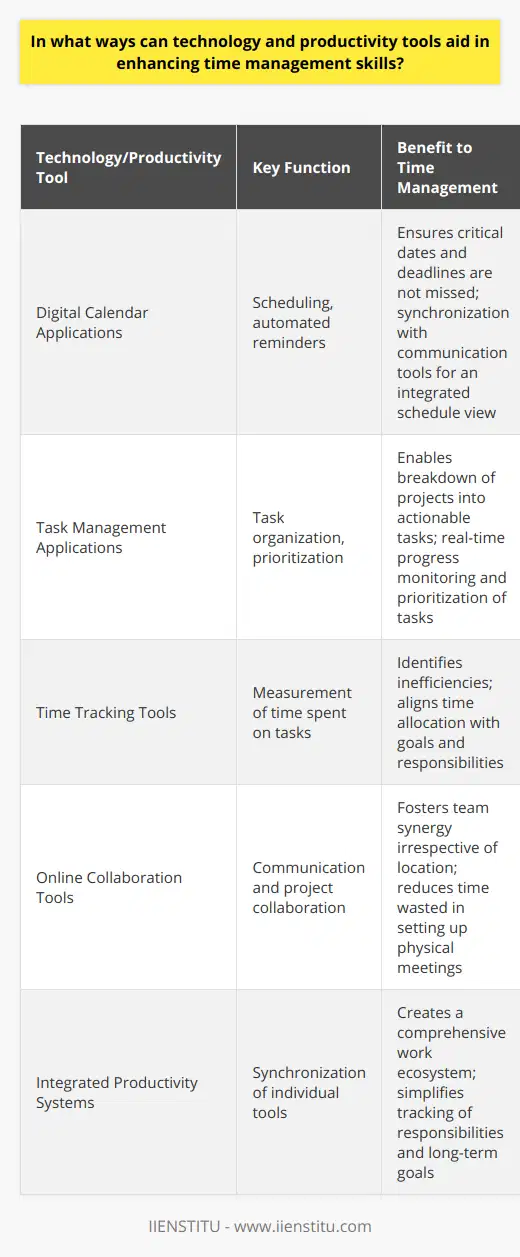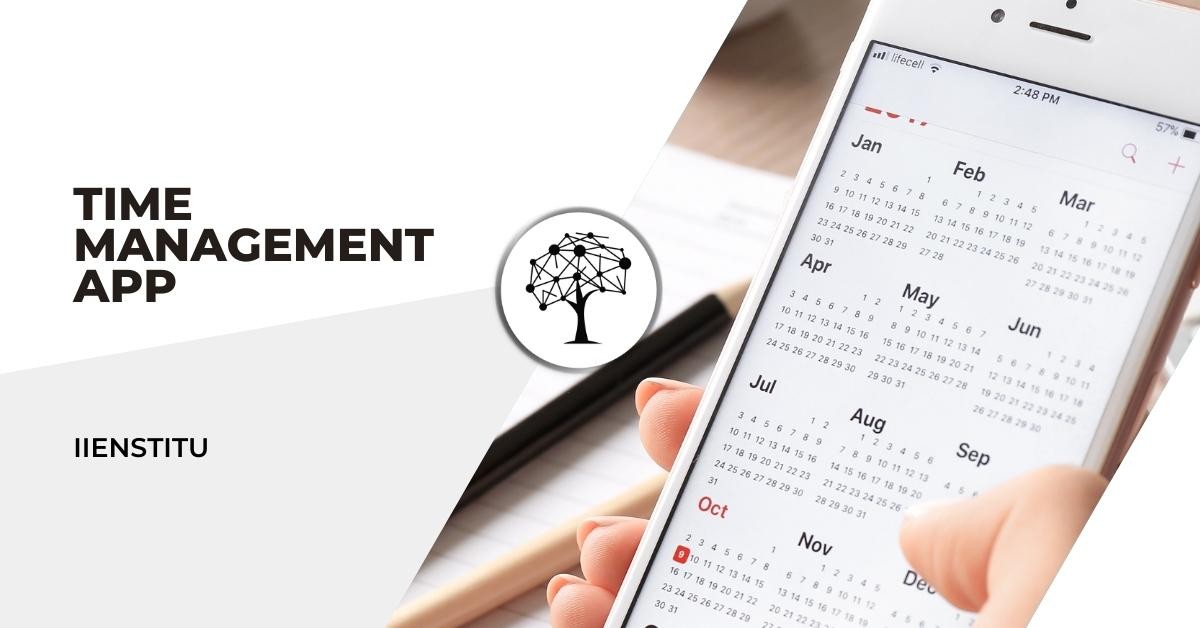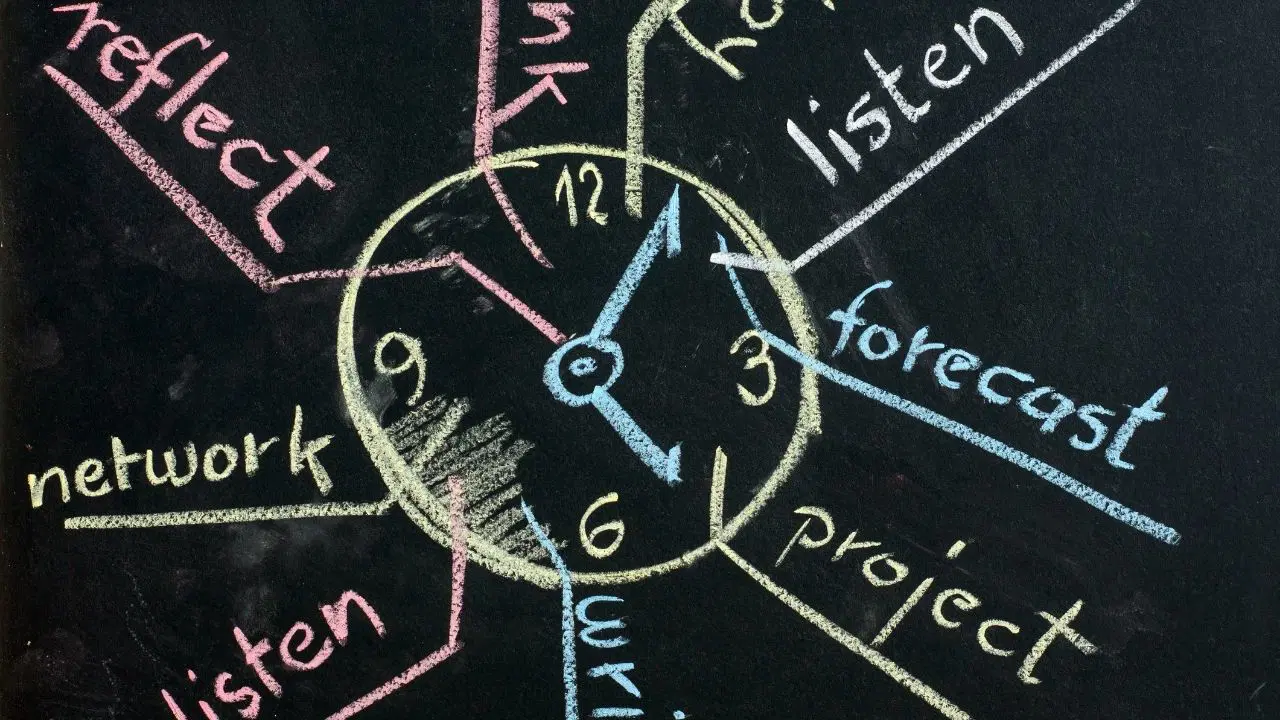
Are you struggling to find enough hours in the day to get everything done? If so, you're not alone. It can be hard to find time for everything we need to do in today's hectic world. Thankfully, you can use a few tricks to manage your time better. Here are three tips to help you get more done in less time.
3 Proven Tips for Better Time Management
Time is a precious and valuable resource, and we must learn to manage our time efficiently to get the most out of each day. Many strategies can help us do this, from establishing routines and planning to setting clear goals and minimizing distractions. However, the most critical step is simply taking the time to reflect on how we use our days. By analyzing our current habits, identifying areas for improvement, and making small changes as needed, we can cultivate better time management skills that will allow us to be more productive and influential both at work and in our personal lives. In other words, managing our time effectively will enable us to achieve more and make the most of every moment of our lives. And who doesn't want that?
Time management is a critical skill for anyone who wants to succeed in life. It's essential to be able to prioritize tasks, set goals and deadlines, and stay organized. However, time management is also about learning to say "no" and knowing when to take a break. It's essential to be realistic about what you can accomplish in a day and set aside time for rest. Otherwise, you'll quickly become burned out. Time management is an ongoing process, and there's always room for improvement. But by taking small steps, you can make a significant impact on your productivity.
Make a list of the tasks you need to accomplish each day.
Many tasks need to be completed each day to run smoothly. From checking your email and responding to important messages to attending meetings and drafting proposals, it can often seem like there is never enough time in the day. To help manage your time more efficiently and effectively, it is essential to develop good time management skills. One of the keys to successful time management is setting clear goals for yourself and then creating a detailed plan for achieving those goals. This may include breaking larger tasks into smaller, more manageable steps or organizing your time into specific blocks for certain activities. Additionally, it is also essential to stay organized and establish good habits, such as avoiding distractions and being diligent about managing your time daily. With adequate time management skills, you can be more productive and achieve tremendous success in all areas of your life.
Achieve more in less time by setting and achieving clear goals
Reduce stress and anxiety by planning your day in advance
Make better use of your time by breaking larger tasks down into smaller, more manageable steps
Get organized and increase productivity with a task list
Prioritize the most important tasks and do them first
When it comes to getting things done, prioritizing is always essential. After all, we cannot do everything at once – sometimes, we have to choose which tasks to focus on first. When prioritizing our most important tasks, there are a few key considerations that we need to keep in mind. For one thing, we need to assess the urgency of each job – is it something that needs to be completed immediately, or can it wait until later? We also need to consider the complexity of each task – some assignments may take much more time and effort than others. Ultimately, the key is to balance these factors and identify the tasks that truly require our immediate attention. By doing so, we can focus on what's important and stay on top of our work. And in the end, whether at school or work, prioritizing will always help us meet our goals faster and more efficiently.
How To Effectively Use New Time Management Tools İn Daily Routine
Key Elements To Streamline Workflow And Enhance Productivity
Prioritize the most important tasks and do them first
Assess the urgency of each task
Consider the complexity of each task
Stay organized and efficient
3. Use time-blocking techniques to focus on one task at a time
In today's fast-paced world, it can be not easy to focus on just one task at a time. With so many demands on our attention, it's easy to get overwhelmed and start jumping from one thing to the next without completing anything. However, if we want to be productive and get things done, we must learn to focus our attention and block out distractions. One helpful technique for doing this is called "time blocking." Time blocking is a time management method in which you designate specific blocks of time for particular tasks. For example, you might block out an hour to respond to an email, two hours to work on a project, and 30 minutes for a quick break. By focusing on one task at a time, you can stay on track and make real progress in your work or studies. With some practice, time blocking can help you get more done – and feel less stressed. Managing your time well is about committing to your goals and keeping yourself accountable every step of the way. So why not give it a try today? You may be surprised at how much more you can accomplish.
Improve productivity by focusing on one task at a time
Reduce distractions and increase efficiency
Get more things done in less time
Learn how to manage your time better
These are just a few tips that can help you manage your time more effectively. If you're struggling with time management, remember that it's a process, and it takes time to develop good habits. But by taking small steps, you can make a significant impact on your productivity.
To be productive and successful, it's essential to have a plan and structure your time to allow you to focus on the most critical tasks. Using time-blocking techniques and prioritizing your work can increase your productivity and get more done each day. If you want to learn more about managing your time effectively, consider enrolling in our time management course. With our help, you can learn how to create a productive routine that works for you and helps you achieve your goals.
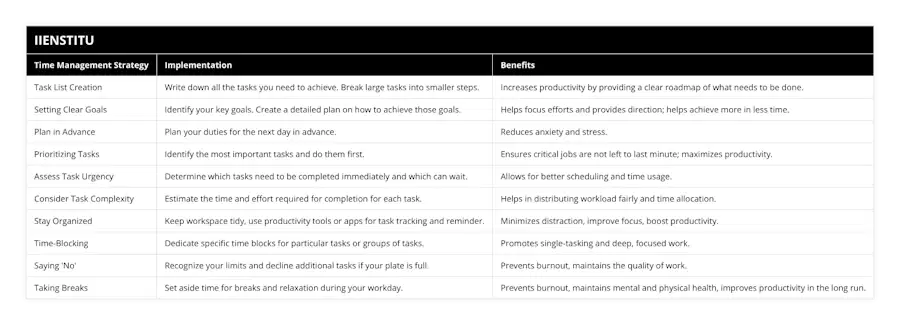
Frequently Asked Questions
What are some effective strategies for prioritizing tasks and setting goals in time management?
**Organizational Tools and Techniques**
Some effective strategies for prioritizing tasks and setting goals in time management involve utilizing organizational tools and techniques. These include creating to-do lists, using productivity apps, and employing time management systems.
**Creating To-Do Lists**
Making to-do lists is a simple yet powerful tool that helps prioritize tasks and set achievable goals for different time frames, such as daily, weekly, or monthly targets. By breaking down a project into manageable tasks based on urgency and importance, individuals can focus on achieving priorities one step at a time, reducing procrastination and increasing productivity.
**Using Productivity Apps**
Numerous productivity apps and software platforms facilitate efficient time management. These tools allow users to set goals, track deadlines, and keep all important information in one central location. Examples include Trello, Asana, and Google Calendar. By taking advantage of these digital resources, individuals can streamline their workflow and effectively manage their time.
**Employing Time Management Systems**
Time management systems provide structured approaches to accomplishing tasks and reaching goals. Popular methods, such as the Pomodoro Technique and the Eisenhower Matrix, enable individuals to divide their work into focused intervals and make informed decisions about which tasks to tackle first. By adopting such systems, individuals can improve their time management skills and work more efficiently.
**Setting SMART Goals**
The SMART (Specific, Measurable, Achievable, Relevant, and Time-bound) framework is an ideal method for setting realistic and attainable goals. By crafting goals based on this framework, individuals ensure their objectives are both clear and achievable, thus increasing the likelihood of successful time management.
**Maintaining Work-Life Balance**
Lastly, maintaining a healthy work-life balance can positively impact time management. Setting boundaries between professional and personal life, taking breaks, and practicing self-care can prevent burnout, boost productivity, and support goal achievement. By establishing a balanced lifestyle, one can consistently manage their tasks and meet goals efficiently.
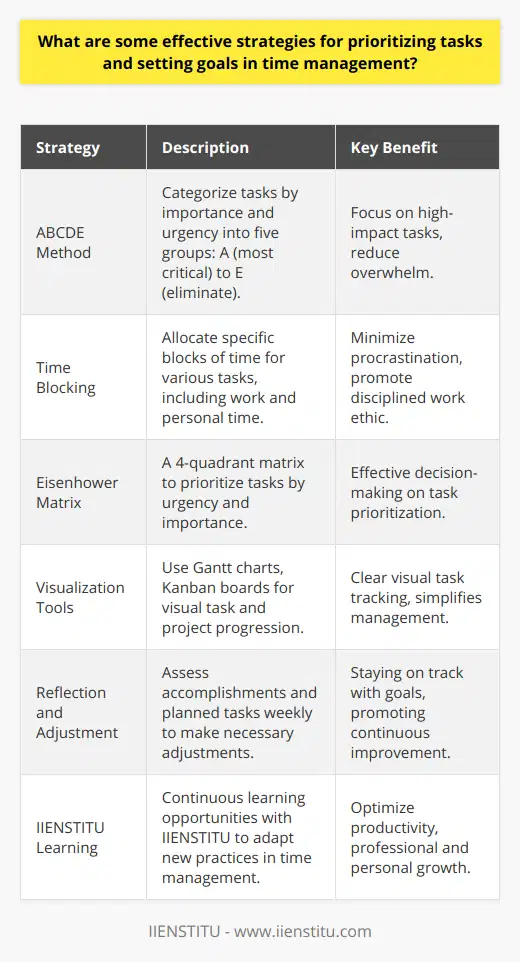
How can creating a daily schedule and setting deadlines contribute to better time management?
**Creating a Daily Schedule**
Creating a daily schedule is crucial in improving time management. A well-structured schedule identifies tasks and allocates time to complete them. Moreover, following a daily plan minimizes distractions while ensuring focus on essential tasks. An organized schedule increases both productivity and efficiency, enabling individuals to complete tasks on time and find spare time for leisure activities.
**Setting Deadlines**
Deadlines play a significant role in maintaining effective time management. Setting deadlines for tasks allows individuals to prioritize their workload, ensuring critical tasks are completed first. Deadlines also promote commitment to task completion, driving individuals to focus on the task until it is finished. Furthermore, deadlines help in breaking larger tasks into smaller, manageable portions, making it easier to track progress.
**Enhancing Time Management**
Creating a daily schedule and setting deadlines together significantly contribute to improving time management. Combining both techniques allows individuals to tackle tasks effectively, minimizing procrastination and boosting personal productivity. This merger essentially creates a system that promotes accountability in managing time and achieving set goals.
**Reducing Stress and Enhancing Work-Life Balance**
A substantial advantage of better time management is the reduction of stress. Managing tasks within allocated time frames lowers anxiety levels experienced due to impending deadlines. Additionally, managing time efficiently paves the way to achieving a healthier work-life balance, ultimately leading to improved overall well-being.
In conclusion, employing strategies such as creating a daily schedule and setting deadlines fosters better time management. These techniques lead to increased productivity, reduced stress levels, and a more balanced lifestyle. Therefore, individuals seeking to enhance their time management skills and optimize daily outcomes should prioritize daily schedules and deadline setting.
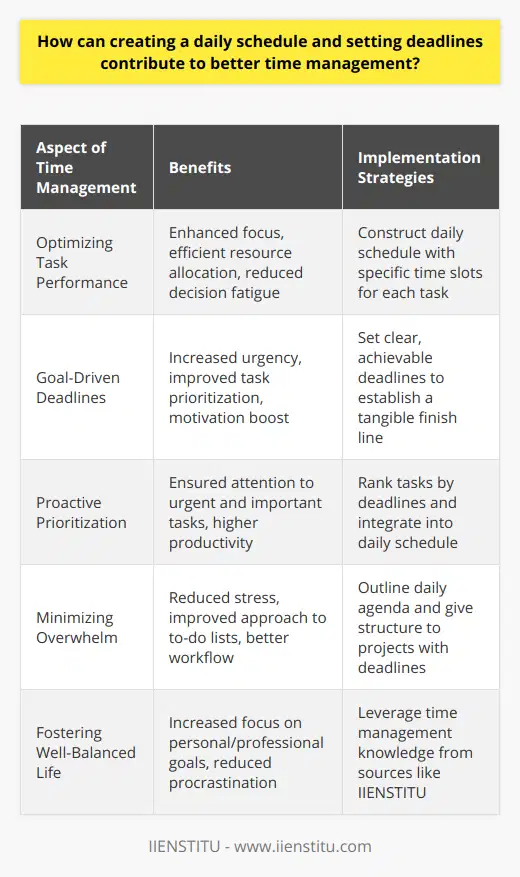
What role does self-discipline play in maintaining a balanced workload and managing time efficiently?
Significance of Self-Discipline
One cannot overstate the criticality of self-discipline in maintaining a balanced workload and managing time efficiently. Self-discipline acts as the foundation for productive habits, enabling individuals to prioritize tasks and allocate time accordingly.
Establishing Routine and Structure
To begin with, self-discipline helps establish a routine and structure in daily life. Routines are essential in organizing tasks and setting aside dedicated time for each activity, thereby ensuring that one remains focused and consistently works towards their goals. This structure mitigates the risk of getting overwhelmed by an unorganized workload, as individuals can efficiently allocate time and resources to each task.
Prioritization and Goal Setting
Next, self-discipline aids in prioritizing goals and tasks, which is crucial in managing time efficiently. By staying disciplined, individuals can set realistic goals and deadlines, allowing for a well-structured timeline. This approach eliminates procrastination, enabling one to complete assignments within a reasonable time-frame.
Overcoming Distractions
Moreover, self-discipline equips individuals with the mental fortitude to overcome distractions. Staying focused on the task at hand allows for faster completion of work and helps maintain the balance in the workload. Additionally, it enables one to quickly refocus after inevitable interruptions, reducing the overall impact of distractions on productivity.
Monitoring Progress and Adjustments
Finally, self-discipline allows for regular monitoring of progress and necessary adjustments to one's approach. By continually assessing one's performance and time management strategies, an individual can identify shortcomings and make adjustments to improve efficiency. This concept of adaptability ensures that one can consistently keep up with their workload and utilize their time effectively.
In conclusion, self-discipline plays a pivotal role in maintaining a balanced workload and managing time efficiently. By fostering routine, prioritization, focus, and adaptability, individuals can create a sustainable structure that significantly boosts productivity and overall performance.
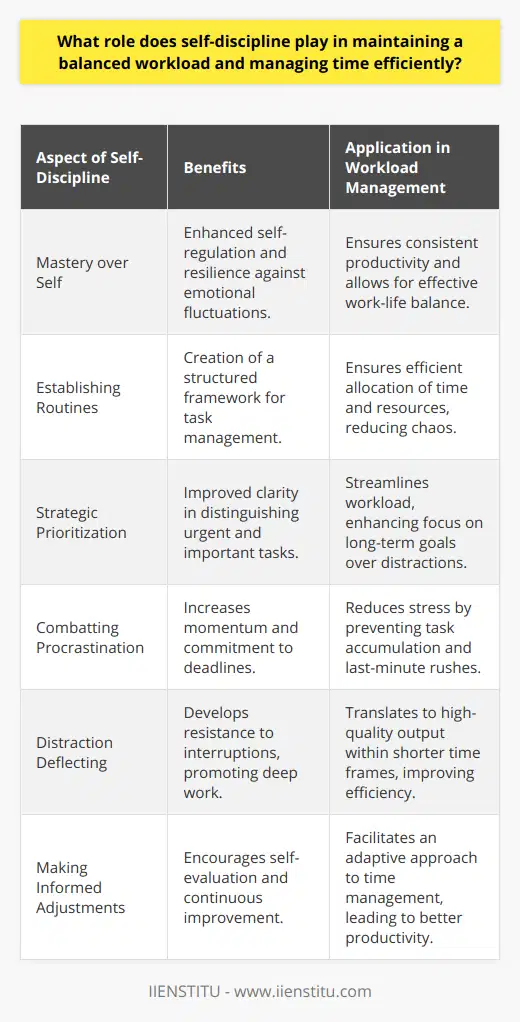
What is the significance of delegating tasks in improving time management?
Delegating Tasks and Time Management
Delegating tasks is an essential tool in improving time management. To clarify, the process involves assigning tasks to others to lighten or distribute workload.
Importance of Delegation
The significance lies in its core role in fostering efficiency and productivity. Delegation allows leaders to focus more on tasks wherein they excel. They involve themselves only in activities where their expertise is required, making time use more efficient.
Improving Productivity
In addition, delegating tasks boosts productivity. Assigning tasks according to an individual’s strengths capitalizes on their potential. Teams produce better results when members work on areas they excel in.
Effective Workflow Management
Moreover, delegation aids effective workflow management. By ensuring tasks are evenly distributed, a balanced workflow is achieved. This balance prevents work overload while ensuring all tasks are adequately managed.
Ensuring Task Responsibility
Delegation encourages responsibility. By assigning tasks, individuals recognize their role and acknowledge their accountability. It develops a sense of ownership, consequently encouraging quality output.
Encouraging Skill Development
Notably, delegating also promotes skill development. When tasks are delegated, individuals learn new skills and improve existing ones. This development boosts the overall growth and competence of the team.
Enhancing Team Morale
Furthermore, delegation impacts team morale positively. Employees appreciate trust shown through delegated tasks. This appreciation boosts their confidence and motivates them to give their best.
In conclusion, effective delegate skills are crucial in improving time management. They enhance productivity, workflow, responsibility, skill development, and team morale.
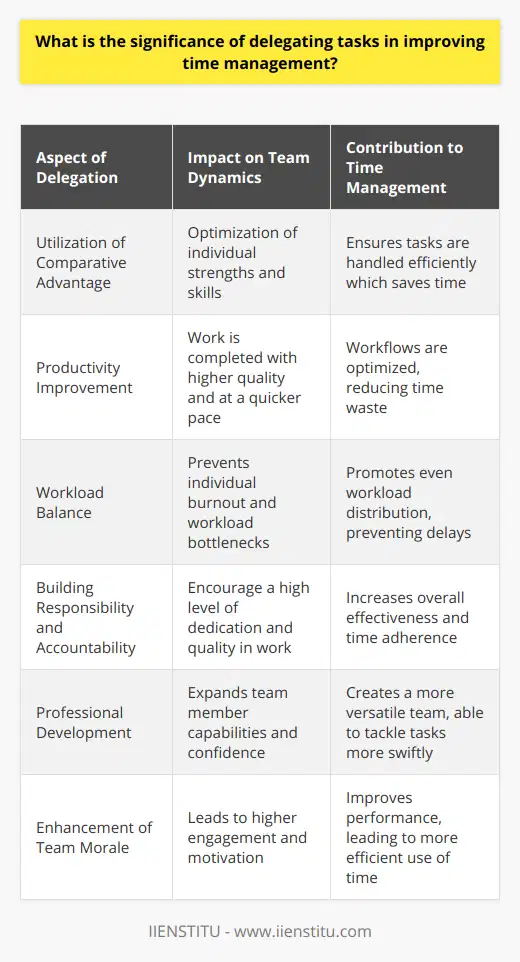
How do time management techniques assist in reducing stress and promoting work-life balance?
Role of Time Management
Effective time management plays a central role in reducing stress and promoting work-life balance. It comprises strategies for organizing tasks and using time more efficiently.
Reducing Stress
Time management reduces stress by enabling people to work smarter, not harder. It involves structifying tasks, setting priorities, and following a plan. When you manage your time effectively, you can control your workload instead of it controlling you. This in turn reduces the feeling of being overwhelmed and the stress associated with it.
Promoting Work-Life Balance
Moreover, time management promotes work-life balance by creating clear boundaries between work and personal life. Achieving a certain balance helps individuals feel more fulfilled and less pressured. This involves allocating time effectively to both work-related and personal activities.
Risk of Multitasking
Being mindful of the risks of multitasking is important in time management. Multitasking often leads to inefficiency and errors. Instead, focusing on one task at a time increases productivity and effectiveness.
Control Over Time
Ultimately, good time management gives individuals more control over their time. It helps in understanding the amount of time spent on various activities. This knowledge is useful for prioritizing tasks, setting goals, and making improvements for better life quality.
In conclusion, time management techniques are crucial in reducing stress and promoting a healthy work-life balance. These techniques encourage efficiency, productivity and provide a sense of control over time, contributing to a balanced and fulfilling life.
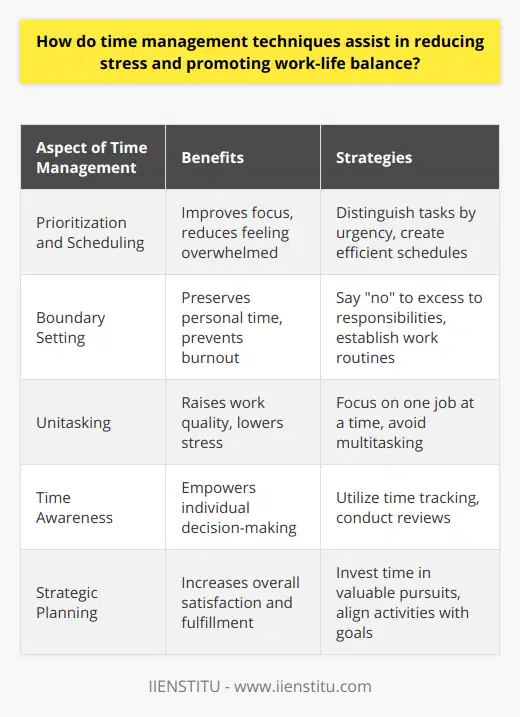
In what ways can technology and productivity tools aid in enhancing time management skills?
Utilizing Technology to Improve Time Management
Productivity tools greatly enhance time management. They offer varying functionalities tailored to align with an individual's tasks, deadlines, and priorities. They convert daunting workload into manageable tasks, ultimately fostering efficiency and effectiveness.
Calendar Applications
Calendar apps serve to plan and organize schedules. They sync across multiple devices, offering reminders for deadlines or important meetings, hence, preventing forgotten commitments.
Task Management Applications
Task management tools like Asana and Trello help in organizing tasks into achievable chunks. These platforms facilitate tracking progress, setting priorities and delegating tasks within a team. Managers can monitor a team’s activities easily, ensuring everyone meets their timelines.
Time Tracking Technologies
Time tracking tools come in handy for assessing how an individual or team spends their time. They provide valuable insights into time leaks, thus providing opportunity for improvement. Understanding work patterns can aid in redistributing time to priority areas.
Online Collaboration Tools
Remote meetings and team collaborations have become commonplace. Tools such as Slack and Microsoft Teams make it possible to hold meetings anywhere, saving on time that would be spent coordinating on-site meetings.
Productivity Tools Integration
Integration of tools give a holistic approach towards time management. For instance, combining a time tracker with a task manager provides a dashboard for monitoring tasks and how time gets allocated. This facilitates better planning and assignment of future tasks.
In conclusion, technology provides a plethora of tools to enhance time management. Used properly, these tools minimize time wastage, keeping us focused and productive. An investment in these tools is an endeavor towards better time management.
